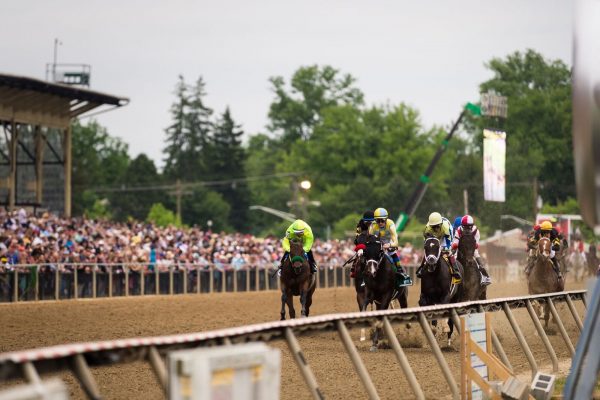2021 Preakness: Bob Baffert Betamethasone Doping Scandal
Unscrupulous trainers who drug horses with agents like betamethasone put both animals and jockeys at risk of life and limb. (Mike Jordan)
BALTIMORE — The running of the 146th Preakness Stakes at Pimlico Race Course should excite the citizens of Baltimore, but it will now occur under very disappointing circumstances. Before a single horse has even taken a stride, the second leg of thoroughbred racing’s Triple Crown has been tainted by doping.
That’s because Bob Baffert’s Medina Spirit, tested positive for unacceptable levels of betamethasone, an anti-inflammatory pain-masking drug administered to horses to cover up or alleviate injuries. While a second test of the horse’s Derby Day blood sample is being analyzed to confirm the presence of the illegal levels of the substance, Baffert first claimed Medina Spirit wasn’t given betamethasone at all and then changed his story saying it was an ingredient in an antifungal ointment the horse was given once a day before the Derby to treat a skin condition.
With Baffert’s long track record of drug violations he’s become widely known as a serial offender of race-day anti-doping rules. Over the last four decades, Baffert’s horses have failed more than 30 drug tests — five of those within the last two years. In 2020, Baffert’s Gamine failed a test at the Kentucky Oaks – a prominent event held just prior to the Derby – for the same drug found in Medina Spirit.
And in 2019, Baffert and his prized Triple Crown winner Justify were entangled in a similar scandal. After the horse won the Triple Crown, authorities learned the horse had tested positive at a qualifying event, but the test results were swept under the rug by the California Horse Racing Board, whose chairman had a horse in training with Baffert at the time.
But these drug scandals aren’t just a matter of cheating bettors and enthusiasts; it’s dangerous for both the horses and jockeys alike. Over the past three years alone, we’ve seen more than 2,000 horses die at American racetracks, and the death toll continues to rise. Devious trainers who dope horses put both animals and jockeys — who may or may not know they are jockeying a drugged horse — at risk of life and limb. And, of course, trainers who drug their horses are trying to rig the system, making a mockery of anyone who bets based on the statistics of the athletes involved.
The betting public should not tolerate the racing industry’s drug addiction any longer.
But there is hope that doping may soon be brought to an end. The U.S. Congress passed the Horseracing Integrity and Safety Act to establish a national, uniform standard for drugs and medication in horse racing. It grants drug rule-making, testing, and enforcement oversight to a private, nonprofit self-regulatory organization overseen by the U.S. Anti-Doping Agency. The legislation also banned the use of all race-day medication and was backed by Animal Wellness Action, The Jockey Club; The Breeders’ Cup; the Water, Hay, Oats Alliance; and all three legs of the Triple Crown. Following the indictment of 27 trainers, veterinarians, and other racing interests last March, Baffert himself announced his endorsement of the legislation on the same day the Washington Post’s editorial board called for the end of horse racing.
But the new law doesn’t take effect until mid-2022.
And while Churchill Downs and the Kentucky Derby has banned Baffert from its grounds while awaiting the results of the second blood test, the Preakness and Pimlico announced they’d cleared Medina Spirit to race with “rigorous testing and monitoring” after Baffert’s admission that his horse had been treated with that betamethasone antifungal. Now racing fans and horse protection advocates must ask what, exactly, the Preakness and Pimlico are ever going to do to prevent a cheating debacle.
While racing enthusiasts sip their signature black-eyed Susan cocktails at the Preakness, we will all have to wonder whether the horse racing industry will continue to allow those who are drugging horses to give the sport another black eye or if it will rally behind the implementation of the new law and call for Baffert’s exile from U.S. horse racing if he’s proven to be guilty.
Marty Irby is a former 8-time world champion equestrian who currently serves as executive director at Animal Wellness Action in Washington, D.C. Marty was honored in 2020 by Her Majesty, Queen Elizabeth, II for his work to protect horses. Follow him on Instagram, Facebook and Twitter @MartyIrby.

